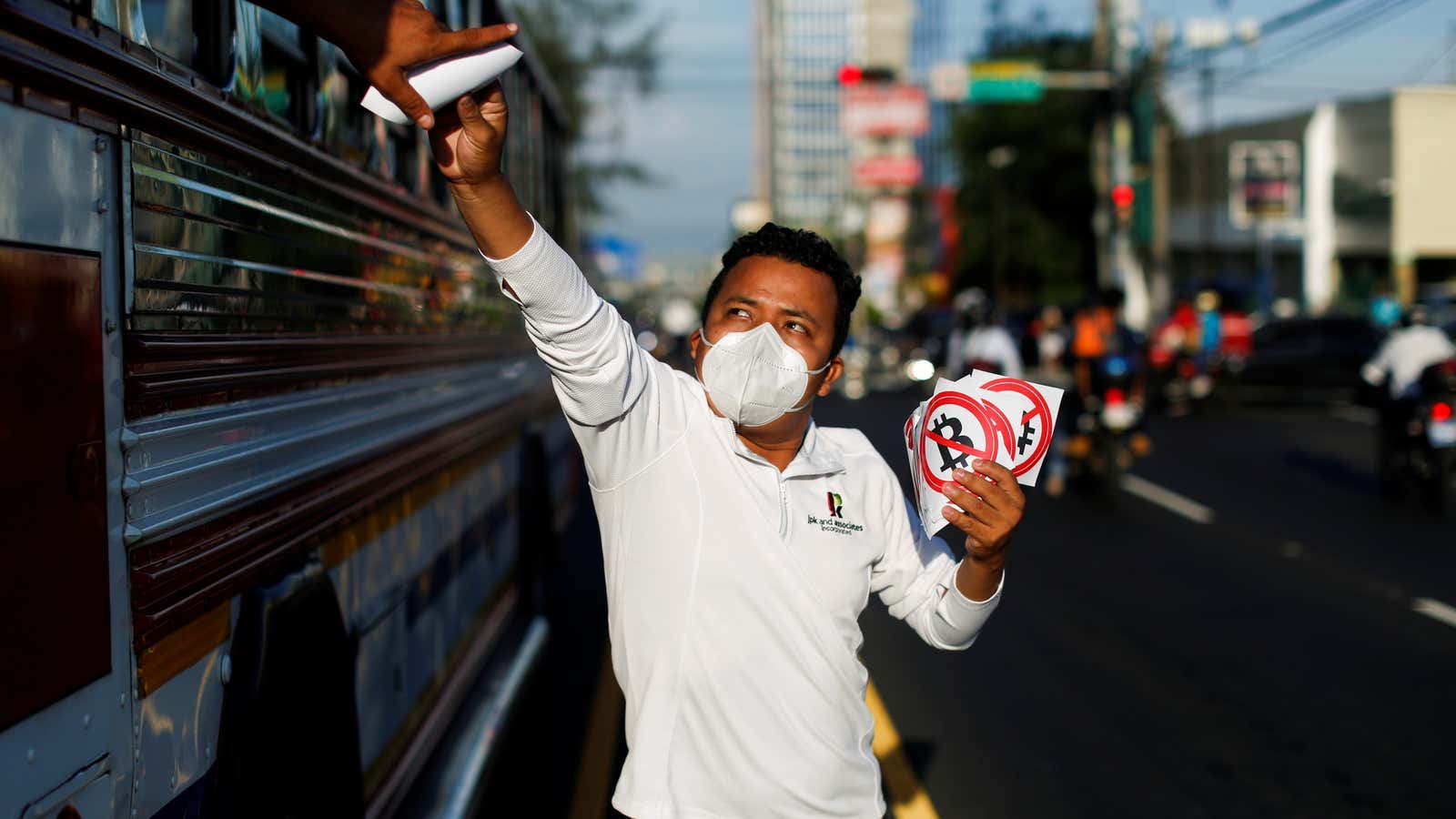In El Salvador, “chivo” is slang for “cool.” It’s also the name of a new bitcoin wallet app, which president Nayib Bukele plans to launch on Sept. 7, the day the nation becomes the first in the world to adopt bitcoin as one of its national currencies.
But Bukele, the tech-savvy 40-year-old who has made bitcoin adoption happen, ought to know that coolness can’t be forced. In recent days, some citizens and economists who question the wisdom of Bukele’s bold plan are making that much clear with street protests.
Why is El Salvador using cryptocurrency?
Bukele’s daring move was widely celebrated by the bitcoin community when he revealed his intentions in June. Under the country’s Bitcoin Law, businesses would be obliged to accept bitcoin or the US dollar, the country’s other official currency, as payment. Either could be used to pay taxes or bank loans, according to the Wall Street Journal. Salaries and pensions would still be paid in dollars.
The government will spend up to $75 million to airdrop $30 worth of bitcoin into Chivo wallets, accessed by an online app, according to the Wall Street Journal. That funding would cover the cost of seeding 2.5 million users with bitcoin in a country of 6.5 million.
For reference, $30 is approximately 0.00062 of a full bitcoin today. (As of Aug. 31, one bitcoin was trading for about $48,000.) The government has also created a $150 million fund to support bitcoin to USD conversions and is rolling out Chivo ATMs. Using bitcoin will be totally optional, Bukele has clarified, and those who chose to maintain a bitcoin wallet are not limited to the Chivo app.
Bukele and his supporters believe that furnishing citizens with cryptocurrency will seed a brighter, wealthier future for the country. According to the president, adopting bitcoin, which is easy to send across borders, will greatly reduce the fees people pay to send and receive remittances, which make up roughly 20% of the current GDP. (As the Guardian notes, a paper by Johns Hopkins University researchers challenges that assertion.)
The shift is also meant to attract foreign investment and entrepreneurs in the crypto space. Bank of America has suggested El Salvador’s new bitcoin policy could help modernize banking and increase access to digital payments in a country where 70% of citizens do not have a bank account.
Why not everyone buys the president’s bitcoin playbook
But the president’s optimism is not shared by everyone. Moody’s downgraded El Salvador’s credit rating at the end of June citing weak governance as a concern. Daniel Munevar, a Colombian economist, told the Guardian that the president is putting both the indebted country’s coffers and a potential IMF loan at risk.
“It’s one thing for an American to bet his stimulus check on cryptocurrency in the hope of big returns, but this is Yolo [you only live once] investing elevated to the national level,” he said.
Another local economist expressed fears that the government is moving too quickly without undertaking a major study of the project’s implications. In recent days, some El Salvadorian citizens have also taken to the streets to protest the policy change, citing fears that crypto’s volatility puts everyday investors at risk and might create chaos in a country already struggling with poverty and corruption. (Bukele’s intention to run a truly democratic and progressive government was in question before he announced the Bitcoin Law.)
The IMF warns against bitcoin adoption
Without mentioning El Salvador or any specific country, the IMF has also laid out a bleak view of all that could go wrong if a country with an unstable economy and unbanked population embraced decentralized digital currencies.
“The most direct cost of widespread adoption of a cryptoasset such as bitcoin is to macroeconomic stability. If goods and services were priced in both a real currency and a cryptoasset, households and businesses would spend significant time and resources choosing which money to hold as opposed to engaging in productive activities,” it said. “Similarly, government revenues would be exposed to exchange rate risk if taxes were quoted in advance in a cryptoasset while expenditures remained mostly in the local currency, or vice versa.”
Moreover, government officials would have less control over monetary policy, and price swings could be destabilizing on several levels, the memo suggested. “Households and businesses could lose wealth through large swings in value, fraud, or cyber-attacks,” it said. Legitimizing cryptocurrency, it also warned, could create channels through which bad players launder money in national banks.
Mining bitcoin is also an energy-intensive process, the IMF post explained. Bukele had spoken to that concern with another plan that has yet to be enacted and tested:
“I’ve just instructed the president of @LaGeoSV (our state-owned geothermal electric company), to put up a plan to offer facilities for #Bitcoin mining with very cheap, 100% clean, 100% renewable, 0 emissions energy from our volcanoes,” he tweeted in June.
Who wins in El Salvador’s bitcoin future?
Is it a pipe dream or is Bukele going to prove the doubters wrong? No one can say, just as it’s unclear whether bitcoin will one day be worthless code or a reliable and more predictable store of value.
But critics argue that instead of serving citizens who have been forced to flee the country in the face of violence, poverty, corruption, and the effects of climate change, the president’s move is mostly aimed at tech migrants and wealthy foreigners eying beachfront properties they can buy with the crypto coin, without paying the capital gains tax they’d face in the US and elsewhere.
The country is already unable to influence the value of the US dollar it adopted over the colón in 2001, so why would it adopt a risky asset without any central control?
Nevertheless, Bukele’s gamble may soon be followed by others: Cuba announced that it will also recognize bitcoin, only it plans to regulate the digital asset, too.
